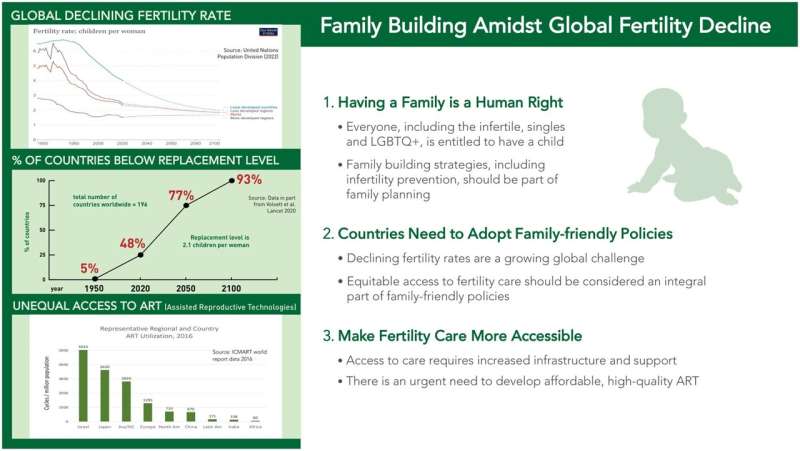This article has been reviewed according to Science X's editorial process and policies. Editors have highlighted the following attributes while ensuring the content's credibility:
fact-checked
proofread
Countries and companies need to address declining global fertility rates, doctors say

The global fertility rate is declining and most governments are failing to recognize and address the impact on economies and societies, say a group of physicians invited by the International Federation of Fertility Societies (IFFS) in a new paper and campaign launched today.
"Not including the effects of migration, many countries are predicted to have a population decline of more than 50% from 2017 to 2100," the physicians write in "Declining global fertility rates and the implications for family planning and family building," published in Human Reproduction Update.
"By 2050, 77% of predominantly high-income countries, and by 2100, 93% of all countries will have a total fertility rate below the replacement level of 2.1 children per woman," write the paper's authors, who include fertility specialists from Australia, Chile, Denmark, Egypt, Greece, The Netherlands, South Africa, Switzerland, United Kingdom, and the United States.
With underpopulation becoming a great concern in many countries, the paper provides recommendations for what governments, policymakers, companies, health care professionals, and patients can do to address infertility risk factors and make fertility care more affordable and accessible.
"Choosing to have a family is a human right," said Bart CJM Fauser, co-first author of the paper, IFFS Scientific Director, and Professor Em. of Reproductive Medicine at Netherlands' Utrecht University. "But access to fertility care is often unaffordable, inaccessible, and inequitable, and that needs to change."
The authors point out that there have been "major advances in fertility care that have dramatically improved family building opportunities (for infertile couples, singles and members of the LBGTQ+ community) over the last three decades," but equity remains a challenge across countries, cultures, and economies.
"The good news is that infertility is often preventable," said IFFS President Edgar Mocanu. "A simple step is offering balanced fertility and contraceptive education so that everybody can decide when to prevent pregnancy and when it is ideal for them to start a family if they choose."
One in six people of reproductive age grapple with infertility, and the problem affects women and men equally. Some sexually transmitted infections, "smoking, excessive alcohol intake, obesity, and poor nutrition can negatively affect both male and female fertility," say the authors.
Alarmingly, infertility risk factors such as air pollution and the proliferation of harmful and poorly regulated chemicals are increasing, making it critical for policymakers to develop and implement policies that reduce environmental infertility risk factors.
Solutions to improving birth rates, the authors say, include "policy measures supporting families and working women," such as compensation for extended pregnancy leave and childcare, parental leave, and increased access to assisted reproductive technology services (ART).
"While more than 10 percent of all children are born with fertility assistance in some wealthy countries, there is great variation in access to care, and the high cost remains a barrier across the board," said Dr. Luca Gianaroli, IFFS Director of Education, and former chairman of the European Society of Human Reproduction and Embryology.
"A limited number of countries have started public funding of fertility treatment to mitigate falling birth rates, and the IFFS is asking that more countries consider providing financial assistance for individuals needing fertility care."
Among their many recommendations, the physicians cite four main calls for action that will be part of their 'More Joy' global awareness and education campaign:
- Governments and companies need to develop policies to reduce infertility risk factors and make fertility care more affordable, accessible, and equitable.
- There is an urgent need to develop simpler, less intensive and less expensive assisted reproductive technologies.
- Health care professionals need to educate their patients about infertility prevention and include fertility awareness as part of family planning and contraceptive education.
- Infrastructure and support are needed to increase access to care, especially in low-resource countries.
"The economic benefits to society of providing fertility care clearly exceed the cost of treatment, and these benefits will only increase as populations become more aged," the physicians write.
More information: Bart C J M Fauser et al, Declining global fertility rates and the implications for family planning and family building: an IFFS consensus document based on a narrative review of the literature, Human Reproduction Update (2024). DOI: 10.1093/humupd/dmad028




















